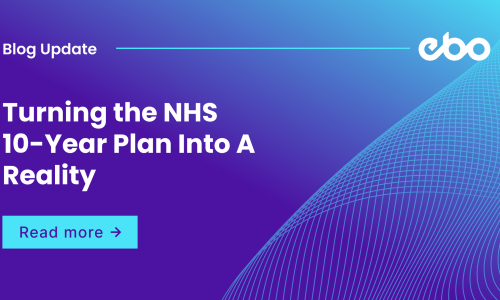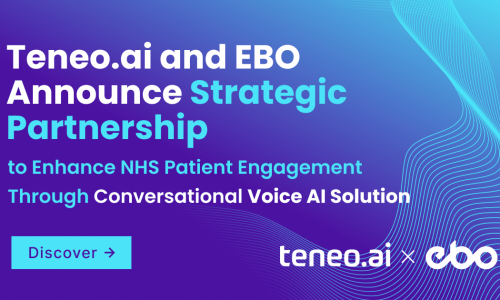Key insights from Paul Boland's talk at HPN South
We’re still buzzing with inspiration from the successful HPN South conference. Paul Boland, EBO’s Healthcare Director, delivered an insightful talk on how the NHS can achieve two critical goals:
- Achieve significantly more effective communications with patients
- Increase workforce capacity through automation
He also offered a glimpse of what the future of digital patient communication looks like, showcasing how this technology will become increasingly integral across the NHS.

In today’s fast-paced world, effective communication and operational efficiency are crucial, especially in healthcare. The NHS has long faced challenges in these areas, and the latest data highlights poor communication as the leading cause of patient complaints outside of clinical treatment. This issue is pervasive, with over half of the public (55%) reporting poor communication experiences within the last five years.
At EBO, we specialise in digital patient communications, leveraging AI automation to address these challenges. By automating patient-facing processes, we not only enhance communication but also increase workforce capacity and reduce operational costs.
Our Conversational-AI technology provides healthcare providers the opportunity to improve how they communicate with patients. It allows them to put the human touch back into patient engagement by enabling 2-way, interactive conversations, even when their staff aren’t available to have them.
Let’s explore some practical examples of how this technology is transforming patient care.

Case Studies: AI in Action
1. Automating Memory Assessments in Mental Health
One notable application of EBO’s technology is in automating memory assessments for older adults at a Mental Health Trust. Traditionally, clinicians spent two hours conducting the 100-question CORE MAMS memory assessment face-to-face with patients. Now, patients receive an SMS two weeks before their appointment, containing a link to an AI-powered Virtual Assistant that guides them through the form-filling process.
Benefits:
Reduces the time from referral to diagnosis.
Clinical time saving at first appointment saving circa 1 hour of clinical time per referral
Carers report being more open in their responses when answering privately.
Improves overall patient experience.
2. Streamlining Patient Validation
In Wales, Betsi Cadwaladr University Health Board, serving nearly 700,000 citizens, has adopted our solution to automate patient validation of waiting lists. Previously reliant on an external call center, this process was slow and costly. Now, patients receive an SMS and complete the validation process with an AI-powered Virtual Assistant in English or Welsh. Download the full case study here.
Pilot Results:
94% of patients rated their experience as positive or neutral.
Freed up 750 appointments, avoiding around £44,000 in DNA costs.
Expected savings of around £137,000 per validation cycle compared to the call center approach.
3. Enhancing Community Health: Parental Consent for Vaccinations
Another success story comes from automating parental consent for school-age vaccinations. At Shropshire Community NHS Trust, consent for 7,200 vaccinations has occurred via EBO’s Virtual Assistant with 95% of parents rating their experience as positive or neutral. During the pilot phase, parents chose the automated route over traditional paper forms, with 100% opting for automation for flu vaccinations. What’s more, the project has saved over 2000 hours of admin time to date. Download the full case study here.
- 97% satisfied with their experience
- Reduced risk of duplicate vaccinations
- 2000+ hours of administrative staff time released to date1.
There are literally hundreds of other patient-facing processes that can be automated. So far we are automating:
Bookings
Self-referrals
Self-assessments
eConsent
Dialog+ assessments

The Future: Intelligent Patient Portals
Patient Portals are not a new concept. They’ve been around for 20 years. But, technology has moved on massively during that period. Patient uptake on traditional portals currently plateaus at 15-20% – and this is after many years of live operation. What about the other 80%?
Here at EBO, we are developing a patient portal that has all the benefits of Artificial Intelligence built in. Think, a combination of traditional patient portal technology with the latest in Conversational AI. This enables a patient-centred experience where patients have more choice, access and control over to their own healthcare. This is really a step-change in patient portal technology and we believe it gives you the opportunity to really supercharge your digital patient communications, allowing you to connect deeply and personally with patients.
Transforming Healthcare Communication
At EBO, our mission is to revolutionise healthcare communication through AI. By enabling effective, automated interactions, we help increase workforce capacity and improve patient experiences. Our Intelligent Patient Portal represents a significant step forward in achieving these goals, ensuring that patients receive the communication and care they deserve.
If you’re interested in learning more about how we can help transform your healthcare communication, please feel free to reach out. Let’s continue the conversation and work together towards a more efficient, patient-centered NHS.

